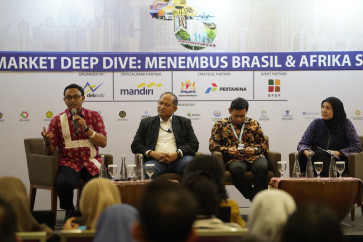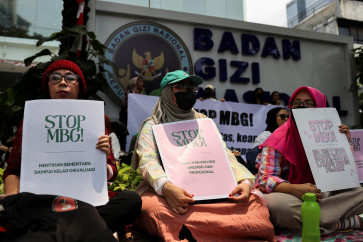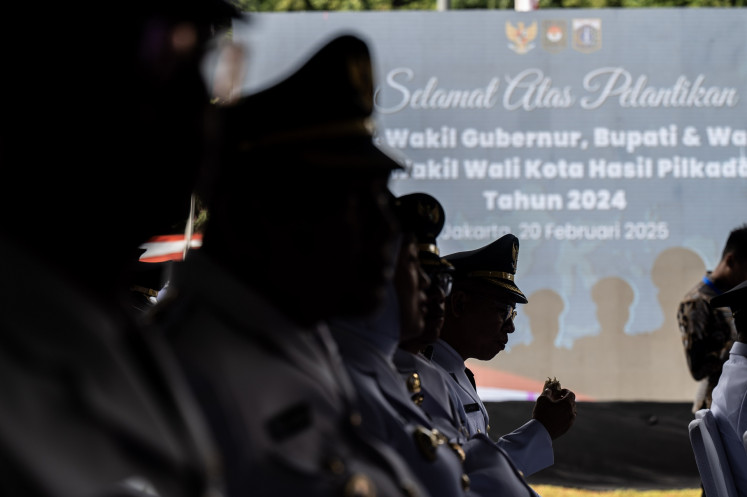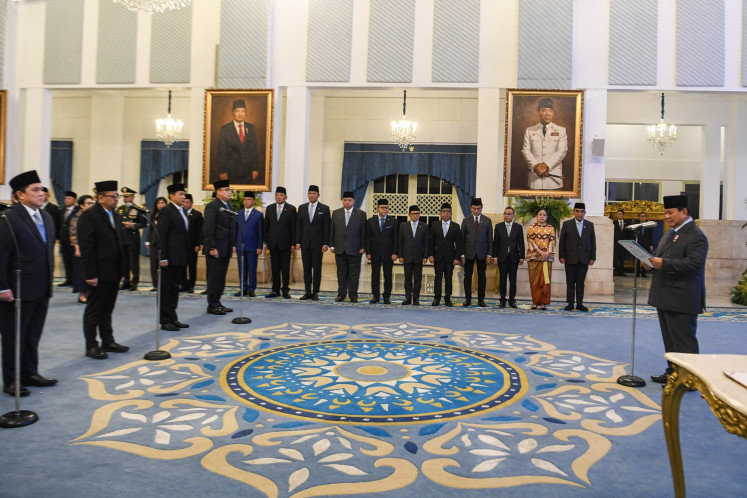Popular Reads
Top Results
Can't find what you're looking for?
View all search resultsPopular Reads
Top Results
Can't find what you're looking for?
View all search resultsAshadi Siregar: Journalism at heart
His friends call him by many nicknames – from the serious “Life Guru” and “Journalist Warrior”, to the jokey “Cynical King” and “Liar”
Change text size
Gift Premium Articles
to Anyone
H
is friends call him by many nicknames – from the serious “Life Guru” and “Journalist Warrior”, to the jokey “Cynical King” and “Liar”.
JP/Dian Kuswandini
No matter what they call him, 65-year-old Ashadi Siregar sees himself simply as a journalist educator, although he admitted being one was something he had never expected.
“Things came unexpectedly in my life,” said the author of the famous trilogy, Cintaku di Kampus Biru (My Love at the Blue Campus). “I failed in [my] journalism career, jumped into the writing world and ended up teaching journalism.”
Ashadi, who recently released his book of testimonies Ashadi Siregar: Penjaga Akal Sehat dari Kampus Biru (the Guard of the Common Sense from the Blue Campus), had not thought his life track would unravel this way as he only had one mission when he left his hometown in North Sumatra for Yogyakarta.
“When I was 19, I left my hometown in Pematangsiantar for Yogyakarta with only one purpose: to study journalism. Nothing more than that,” said Ashadi, whose inspiration to become a journalist came from Indonesia’s press figure Tirto Adhi Soerjo.
Unfortunately, when he got into the Publicist School at the Gadjah Mada University (UGM), he was surprised to find out they didn’t teach journalism at all.
“At that time, during the Old Regime, publicists had nothing to do with journalism — it only dealt with the role of communications within the political world,” Ashadi, the former editor-in-chief of Surabaya Post, explained. “That it didn’t fit my expectation.”
The condition had forced Ashadi to learn about journalism all by himself, but it wasn’t a big deal for him, saying, “ever since I was a kid, I always sought to find the truth and answers on my own. I never asked anybody else.”
Despite the feeling of being in the wrong place, Ashadi continued his university education as a part of his responsibility to his parents.
“I thought I still had to graduate for the sake of my parents who had sent me [to study] from a faraway place,” said the former head of Communications School at Gadjah Mada University. “But I came to stop relying on the formal education system. I thought I needed knowledge, not lecturers.”
This kind of belief is behind his decision not to continue his education with master and doctoral degrees — the titles most educators pursue nowadays. For him, educational titles are never important, as what matters is one’s involvement in their field of interest.
Ashadi was first involved in the field of journalism in 1971, when he established weekly newspaper Sendi with some of his friends such as intellectual Daniel Dhakidae and journalist Zulkifly Lubis.
Unfortunately, the paper, where Ashadi sat as the editor-in-chief, was banned by former president Soeharto after its 13th edition because of its sharp criticism on the government’s plan to build the Taman Mini Indonesia Indah miniature park. The court found Ashadi guilty for insulting the state and the president with a one year of probation jail term.
“Because our media was banned, I automatically failed to become a journalist,” Ashadi said. “At that time, if the government hates you, it would be hard for you to join other media because you were considered the state’s enemy.”
This, Ashadi said, had forced him to jump into the novel world, where he finally released 12 novels, including his first trilogy Cintaku di Kampus Biru, which became so famous that it was adapted to the silver screen with veteran stars Roy Marten and Rae Sita Supit as the main cast.
Not only that, as told by Daniel Dhakidae, the novel was so famous that many youngsters sought love advice from Ashadi through the Kompas daily readers’ column.
“Writing novels only serves as the medium of substitution for me,” Ashadi revealed. “I couldn’t be a journalist, so I thought writing novels could become a stepping stone for me. After all, writing has been my cup of tea since I was in high school. I used to write many short stories, poems and drama reviews for local newspapers.”
Not only that, he also decided to dedicate his life to teach journalist-wannabes at his university.
“Like they say: if you could no longer become an athlete, you could be a coach — a coach who has the will to produce a great athlete,” said Ashadi, who started teaching in 1974 and developed a journalism education blueprint four years later.
Ashadi is indeed serious about producing a good generation of journalists. When he joined Surabaya Post in 1999 as the editor-in-chief, for example, he said he was more into educating the journalists there and taught them how to control the newspaper.
“My job is actually to make journalists understand what their roles are,” said Ashadi, who ended his duty at UGM this year following his retirement as the civil servant. “Journalists today don’t have a good understanding in journalism ethics. They would just do anything asked by their bosses, without
paying attention to journalism values.”
Ashadi shared his concerns that journalists today often take their journalism profession for granted.
“They take this profession easily – they don’t really prepare themselves for it,” he said. “As a consequence, you see many young journalists without adequate knowledge on what they’re doing.”
Therefore, as a journalist mentor, Ashadi often reminds his students that journalists actually serve the public, not the market.
“As a journalist, two sins await you if the news you deliver is useless to the public,” Ashadi said. “The first one is that you’re committed to the sin of filling people’s mind with useless things.
“The second is that you’re committed to the sin of wasting paper and the trees in forests.”










